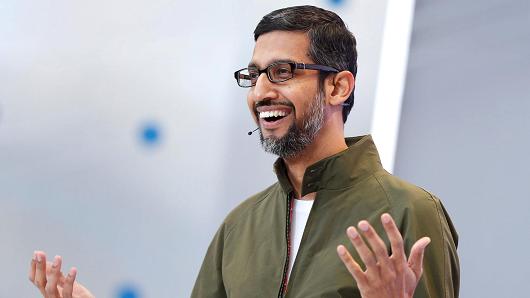
Stephen Lam | Reuters
Google CEO Sundar Pichai speaks onstage during the annual Google I/O developers conference in Mountain View, California, May 8, 2018.
Google put its prowess in artificial intelligence, as well as its commitment to wielding it responsibly, front and center during the keynote of its I/O developers conference on Tuesday.
A rotating cast of Google execs stressed during demos that AI was at the core of their products, showing off advancements in Gmail, Maps, and its smart Assistant. Meanwhile, Google also addressed lightening-rod issues across the tech industry like gadget addiction and filter bubbles by launching new Android tools to help moderate screen-time and a fresh News app that feeds users various perspectives on a given story.
It’s clear that technology can be a positive force, Pichai remarked at the beginning of his talk, but the company can’t just be “wide-eyed” about the potential impact of these innovations.
“We feel a deep sense of responsibility to get these things right,” he said.
This positioning for Google as the kinder, more careful AI-champion isn’t particularly new or surprising for the company. Google co-founder and Alphabet President Sergey Brin dedicated the company’s recent annual letter to this same theme.
“I expect machine learning technology to continue to evolve rapidly and for Alphabet to continue to be a leader — in both the technological and ethical evolution of the field,” Brin wrote.
As Silicon Valley feels the effect of a widespread backlash spurred by fake news, data leaks, and addictive products, Google’s tone makes sense. It collects huge amounts of data on its users, and it needs them to trust it to use that data in ever-evolving ways.
With touching, people-centric stories on how AI is helping doctors diagnose diseases faster or creating better closed-captioning for blind YouTube users, Google’s presentation painted an optimistic vision of its future.
However, one product did bump up against the creepy line.
The company showed off an experiment that let its smart Assistant make phone calls to local businesses. The voice sounded extremely lifelike, even inserting sporadic “um”s and other human mannerisms into its responses as the people on the other end of the line shot it questions. It never revealed that it was a robot.
 EU News Digest Latest News & Updates
EU News Digest Latest News & Updates



